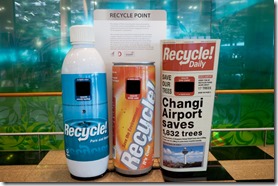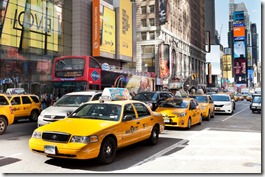Key Impact Areas of Sustainable Events (Part 1/2)
James Watson | Posted on |
When it comes to planning sustainable events, the devil is in the details. Now admittedly, there can be a lot of those details when it comes to planning any type of event and sustainability can quickly add an additional degree of difficulty. By focusing your attention on certain key areas of concern, however, the entire process can be made all the more manageable.

In the 1st of a 2 part series, I’d like to introduce you to 3 key areas of impact – event venue, food and beverage, and transportation – and present some of the sustainability factors you are likely to encounter in relation to each of them while planning your sustainable event.
Part 1 of 2 – Venue, Food, & Transportation
Part 1
1. Event Venue
2. Food and Beverage
3. Transportation
Part 2
4. Accommodations
5. Marketing Materials
6. Products in General
Read here >
Please keep in mind that these are introductions only and that each area could be elaborated upon many times over. For example, the APEX/ASTM Sustainable Event Standards go into minute detail regarding each of these areas. We will present some of the most common sustainability factors relating to each area. If you wish to learn more, please do not hesitate to contact us at Green Event Ninjas.
1. Event Venue
The venue refers to the physical space or spaces where the event will be hosted. This is often one of the first items addressed during the event planning process and therefore it can have a ripple effect on any subsequent decisions. It presents a great opportunity to set the stage for an overall more sustainable event. Take some time to make a careful and informed decision in this area and many decisions regarding sustainability will be made easier going forward.

The following describes several economic, social, and environmental factors related to venue selection:
The venue refers to the physical space or spaces where the event will be hosted. This is often one of the first items addressed during the event planning process and therefore it can have a ripple effect on any subsequent decisions. It presents a great opportunity to set the stage for an overall more sustainable event. Take some time to make a careful and informed decision in this area and many decisions regarding sustainability will be made easier going forward.
The following describes several economic, social, and environmental factors related to venue selection:
Economic Sustainability
– Affordability of booking the space (e.g. discounted rates for students or non-profit organizations)
– Contractual obligations (e.g. requirement to use a preferred caterer for any food and beverage)
Social Sustainability
– Accessibility for persons with disabilities (e.g. barrier free meeting rooms, restrooms, and speaker podiums)
– Proximity to accessible transportation options (e.g. public transportation or nearby handicap parking
Environmental Sustainability
– The environmental aspects of a venue’s building (e.g. it meets a green building certification like LEED, BOMA BEST, or PassiveHouse)
– Proximity to mass transit
– Waste management (e.g. conveniently located and identifiable receptacles)
2. Food and Beverage
Food and beverage service includes all sustenance provided to those participating in an event. So whether you’re simply providing coffee and donuts during a morning meet-up, a catered meal during a formal business luncheon, or you have vendors selling their fare at a festival, there are certain common elements you can begin to consider for your sustainable event.

The following describes several economic, social, and environmental factors related to food and beverage provision:
Economic Sustainability
– Affordable food and beverage options
– Quantity (e.g. an accurate estimation of how much will be needed)
– Flexibility (e.g. your ability to adjust the required quantity shortly before or over the course of a multi-day event)
Social Sustainability
– Accommodating food allergies and other dietary, cultural, and religious sensitivities (e.g. surveying guests in advance and offering alternatives)
– Healthy food options (e.g. organic and whole foods)
– Ability to donate surplus to local charities/food banks (e.g. choosing less perishable foods that can be transported or a service provider with an existing relationship with a food bank)
Environmental Sustainability
– Availability of locally sourced and organic options
– Use of non-packaged items (e.g. water, drinks, sugar, cream/milk)
– Reusable tableware (e.g. food is served with reusable cutlery and place settings)
– Waste management both off- and on-site (e.g. recycling and composting infrastructure in place to separate waste and divert it from landfill)
3. Transportation
Transportation is a big one. It includes the travel of those involved in the event, whether they’re organizers, speakers, guests, etc. For many events, especially for those that attract a national or international audience, this can represent the largest contributor to the event’s carbon footprint (imagine the impact of all those flights). Even so, there are certain things that can be done, particularly when it comes to local transportation options.

The following describes several economic, social, and environmental factors related to transportation:
Economic Sustainability
– Affordability of the available means of transportation (e.g. low-cost options, securing group rates for public transportation or making transport available at no cost to participants)
– Cost of transportation related to organizing tasks
Social Sustainability
– Accessibility for persons with disabilities or special travel requirements
– Reliable, professional, and safe options are available
Environmental Sustainability
– Proximity to public transportation
– Venue is accessible by low-impact transportation (e.g. walking, biking, mass transit)
– Option of participating virtually/remotely is available to participants
Be sure check out the 2nd of this 2 part series to learn how accommodations, marketing materials, and products in general affect sustainable events.
Photo credit (in order): ©iStock.com/baldas1950; ©iStock.com/Elenathewise; ©iStock.com/ShutterWorx.

One Comment